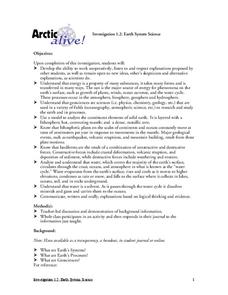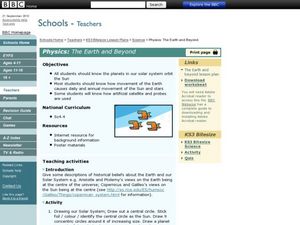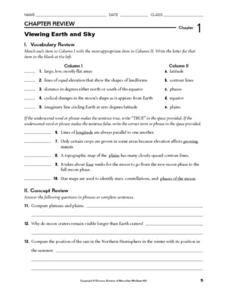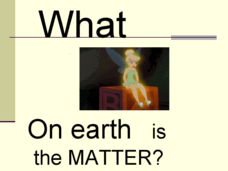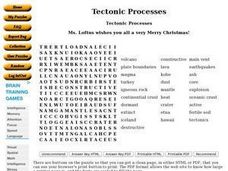Curated OER
Earth System Science
Students explore the Earth and its ability to support life. They discuss the geosphere and the water cycle and complete the Water Wonders activity. After completing the activity, they respond in their journals and reflect upon the...
Curated OER
Physics The Earth and Beyond
Fourth graders will explore our solar system. In this physics lesson plan students create a model of the solar system to explore the movement of Earth, the Sun, and stars.
Curated OER
What is the Mantle Like?
In these earth science worksheets student complete this project to model activity in the mantle, one Earth's four layers. The project includes liquid and powder materials in addition to several measuring components. Students must then...
Curated OER
Forces Inside Earth
For this Earth's forces worksheet, students will review vocabulary words associated with plate tectonics. This worksheet has 8 fill in the blank questions.
Curated OER
Viewing Earth and Sky
In this earth and sky worksheet, learners review terms associated with map reading. Students also review topographic maps and how contour lines represent elevation. This worksheet has 5 matching, 5 true or false, 5 fill in the blank, and...
Curated OER
Aerosol Lesson: Science - Graphing SAGE II Data
Students examine and plot atmospheric data on bar graphs.
Curated OER
What on Earth is Matter?
A somewhat strangely formatted slide show that contains multiple examples of matter types. The classification and state explanations given would be useful as practice of substance identification and the heating curve may prove to be...
Curated OER
Geological Features: How Weathering & Erosion Help Create Landforms
Students explore how the Earth's surface changes resulting in geological features and landforms. They perform a read-a-loud on Thomas
Locker's Mountain Dance, complete a KWL chart, and create a
landform using plaster of paris.
Curated OER
Volcanoes
In this science worksheet, students use basic scientific concepts to complete the series of puzzles that are intended to acquire and review vocabulary about volcanoes.
Curated OER
Geysers, Hot springs, and Bushfires
In this earth science learning exercise, students locate thirty-two terms about the environment. Answers are available in various formats.
Curated OER
Tectonic Processes
In this earth science worksheet, students find the words that help define plate tectonics and the answers are found by clicking the link at the bottom of the page.
Curated OER
Earthquake
In this earth science worksheet, students find the words that are related to the concept of an earthquake and the answers are found at the bottom of the page.
Curated OER
Earthquakes
In this earth science instructional activity, students find the words that are associated with the concept of earthquakes. The answers are found at the bottom of the page.
Curated OER
Rocks - Igneous, Sedimentary, Metamorphic
In this earth science worksheet, learners find the words that are describing the types of igneous, sedimentary, and metamorphic rocks.
Project SMART
Rocks and Minerals: Touch the Earth
Students complete a unit of lessons on rocks and minerals. They conduct research, write e-mail questions to geologists, write daily journal entries, label maps demonstrating types of rocks/minerals found, and create a web page that...
Curated OER
The Celestial Sphere and Circumpolar Motion
Students investigate the celestial sphere and circumpolar motion. In this science lesson, students view an applet, The Celestial Sphere and Circumpolar Motion. Students discuss the Earth's rotation and stellar movement.
Star Date
Modeling the Night Sky
Dramatize the stars and planets as they become a visual representation of the solar system in this activity. Young astronomers track and simulate various constellations as they orbit the Earth to learn the position and motion of...
NOAA
Plankton
Dive into the world of plankton. The 17th installment of a 23-part NOAA Enrichment in Marine sciences and Oceanography (NEMO) program introduces different types of plankton. Young scientists then use what they have learned to classify...
NOAA
Ocean Layers I
How is it possible for ocean water to have layers? The sixth installment of a 23-part NOAA Enrichment in Marine sciences and Oceanography (NEMO) program investigates factors that cause different water densities to occur. Experiments...
Texas State Energy Conservation Office
Global Climate Change
Here is an extensive reading resource that addresses our climate change crisis. It thoroughly explains the greenhouse effect, related Earth cycles, and the history of climate change. Use it as part of the intended unit, published by the...
NOAA
Coastal Dynamics
Life's a beach! The 16th installment of a 23-part NOAA Enrichment in Marine sciences and Oceanography (NEMO) program first examines different types of coasts and how they form. An activity then has learners investigate the shoreline...
NOAA
The Biogeochemical Cycle
The biogeochemical cycle ... no physics? The fourth installment of a 23-part NOAA Enrichment in Marine sciences and Oceanography (NEMO) program introduces the biogeochemical cycle by having pupils simulate movement between Earth's...
NOAA
The Dead Zone
The fifth installment of a 23-part NOAA Enrichment in Marine sciences and Oceanography (NEMO) program defines dead zones and how they form. Pupils then examine data from the Gulf of Mexico to determine dead zone formation.
Chicago Botanic Garden
Historical Climate Cycles
Scientists use ice core samples to obtain temperatures of the earth from 400,000 years ago! The third of five lessons instructs pupils to interpret historical climate data to see changes over time. In part I, participants interpret...
